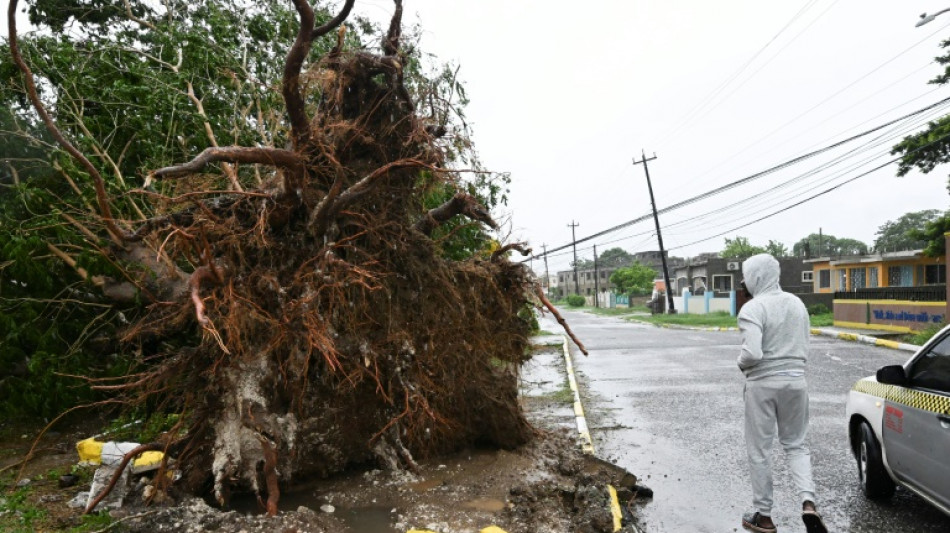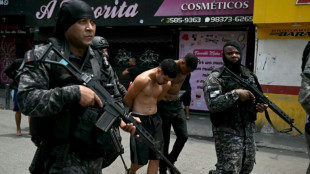

'Catastrophic' hurricane slams Jamaica with fierce winds and rain
Hurricane Melissa ripped up trees and knocked out power after making landfall in Jamaica on Tuesday as one of the most powerful hurricanes on record, inundating the island nation with rains that threaten flash floods and landslides.
The destructive storm struck Jamaica with ferocious sustained winds clocking 185 miles (300 kilometers) per hour on its deadly march across the Caribbean.
"This is an extremely dangerous and life-threatening situation!" warned the US National Hurricane Center, urging residents to stay sheltered and as far from windows as possible, including during the brief calm offered by the storm's eye.
Even as wind speeds dipped to 150 miles per hour, Melissa drenched communities and wreaked damage that may take days to assess as communication links remained largely down.
Surges in seawater combined with rainfall -- which will likely be measured in feet, not inches -- could trigger massive floods and landslides on the island with a population of 2.8 million.
The hurricane was the worst to ever strike Jamaica and hit land with maximum wind speeds even more potent than most of recent history's most brutal storms, including 2005's Katrina, which ravaged the US city of New Orleans.
- 'Severely damaged infrastructure' -
Even before Melissa slammed into Jamaica, seven deaths -- three in Jamaica, three in Haiti and one in the Dominican Republic -- had been blamed on the deteriorating conditions.
Melissa, now downgraded from Category 4 to 5 as its center moved off Jamaica, was set to hit Cuba on Tuesday evening and then the Bahamas.
Jamaica's climate change minister told CNN that Hurricane Melissa's effect was "catastrophic," citing flooded homes and "severely damaged public infrastructure" and hospitals.
And as if that weren't enough: health authorities were urging vigilance against crocodiles displaced by the torrential storm.
"Rising water levels in rivers, gullies, and swamps could cause crocodiles to move into residential areas," posted the South East Regional Health Authority (SERHA) in a public service announcement on Instagram.
Mathue Tapper, 31, told AFP from Kingston that those in the capital were "lucky" but feared for fellow Jamaicans in the island's more rural areas.
"My heart goes out to the folks living on the Western end of the island," he said.
The mammoth storm could leave devastation on the scale of some of the worst hurricanes in recent memory like Katrina, Maria or Harvey.
- Climate change impact -
Broad scientific consensus says human-driven climate change is responsible for intensified storms like Melissa that are occurring with increased frequency and higher potential for destruction and deadly flooding.
Melissa had quickened slightly, but still lingered over the island enough that the rains were particularly dire.
"Human-caused climate change is making all of the worst aspects of Hurricane Melissa even worse," said climate scientist Daniel Gilford.
The Jamaican Red Cross, which was distributing drinking water and hygiene kits ahead of infrastructure disruptions, said Melissa's "slow nature" exacerbated the anxiety.
The UN is planning an airlift of some 2,000 relief kits to Jamaica from a relief supply station in Barbados once air travel is possible. Assistance is also planned to countries including Cuba and Haiti, UN spokesperson Stephane Dujarric said in a briefing.
Jamaican officials said some 25,000 tourists were in the country famed for its normally crystalline waters.
Olympian sprinter Usain Bolt, one of Jamaica's most famous figures, was posting regularly on social media with messages for his home country: "Pray for Jamaica."
X.Mahi--HStB




